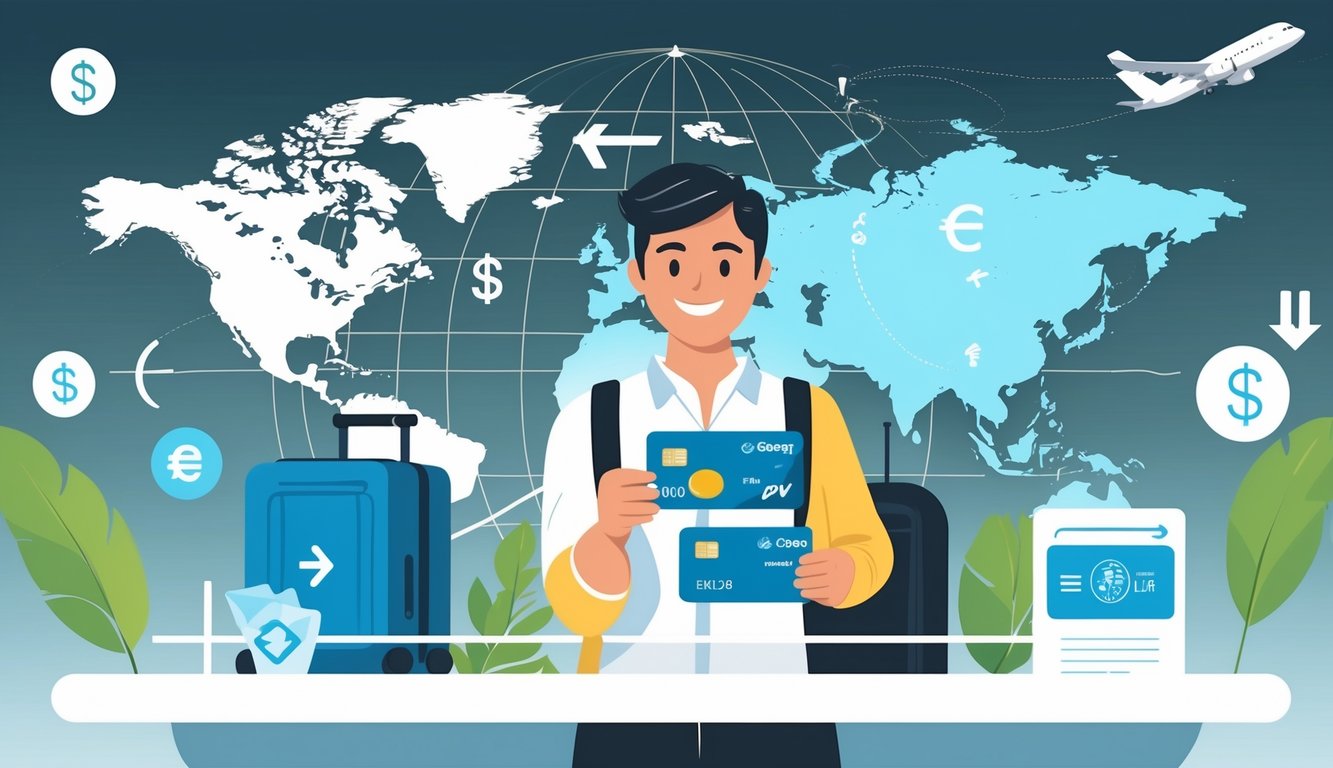
Avoiding Common Pitfalls With International Card Usage
I’m jogging through an airport, muttering about fees and trying to keep track of which card is in which pocket. That random restaurant in Rome tacked on a 3% fee because I used the wrong card—painful. Two weeks later, surprise charges pop up and suddenly all those points feel pointless.
Recognizing Hidden Fees on the Road
Tapping for coffee in Tokyo—bam, foreign transaction fees. Chase Sapphire Preferred? No fees. My old bank card? 2.99% on every foreign purchase. Some cards even charge withdrawal fees on top of ATM fees. And don’t get me started on “dynamic currency conversion”—a Visa rep called it a “cash grab.” Always pick the local currency.
I learned to pair zero-foreign-fee cards with local currency and never trust so-called “travel cards” without reading the fine print. Some hide fees in bad exchange rates. I’ve yelled at HR for not reading the company card agreement. Loyalty points get eaten by hidden surcharges. How are you supposed to track rewards when the deductions are invisible?
Maintaining Security and Protecting Your Data
Midnight in an airport, one eye open, phone buzzing with “unusual activity.” I used to think RFID sleeves were overkill, but after getting skimmed in Barcelona (metro kiosk, $600 gone), I’m a believer. Visa’s 2023 report said two-thirds of travelers get hit with fraud overseas. Even my friend Will, who travels for work, got his card skimmed in a business lounge.
Now I bring two cards: one with a low limit, one locked unless I need it. Every transaction triggers an alert—no exceptions. I never use hotel Wi-Fi for anything sensitive. Paranoid? Maybe. But I’m not spending hours on hold with my bank from another country. Never enter card info on sketchy travel sites—half are phishing, half just sell your data. I only learned that after a travel rewards expert spelled it out at a conference: real horror stories.
Frequently Asked Questions
I’ve stared at bank statements, trying to figure out which international fee just ate my lunch money. I’ve tried prepaid cards, fought with Bank of America, and lost an argument to a Parisian ATM. The ATM won.
What are the best ways to avoid foreign transaction fees with my credit card while traveling?
I swiped my old Visa in Bangkok and got hit with a 3% fee. Didn’t even realize it until I checked the statement. Travel cards like Chase Sapphire Preferred or Capital One Venture? No fee. I asked a finance expert if it’s worth switching, and she just said, “Never pay a fee you don’t have to.” So now I juggle cards, forget PINs, and once got flagged for “unusual activity” at a gelato shop.
Can I get foreign transaction fees waived, and if so, how?
Every time I ask my bank to waive a foreign transaction fee, it’s like yelling into a void. One friend with an Amex Platinum says he sometimes gets charges reversed if he complains enough, but that’s rare. Usually, if the card says no waivers, you’re out of luck. My best move? Signed up for a no-foreign-fee card after reading about it in a forum. Fifteen minutes, no annual fee, problem solved. Sometimes I just use cash from an airport ATM if things get weird.
Which credit cards offer zero international transaction fees?
There’s no official list, which is annoying. My favorites are Capital One Venture X and Chase Sapphire Preferred—no international fees, swipe away. Most premium travel cards skip the fee, but some cashback cards (like Barclaycard Rewards in the UK) also sneak in as no-fee options. Not every card marketed for travel is actually good for travel. Always read the fine print, and don’t use store-branded cards abroad unless you like losing money.
Are there any downsides to using credit cards overseas?
Lost my card in Rome, bank didn’t believe me, had to borrow cash from a tour guide who only took PayPal—fees on top of fees. Fraud risk jumps, and banks freeze accounts at the worst times. Dynamic currency conversion is a scam—always pick local currency. And nothing ruins your day like watching your points get eaten by random charges.
How do I minimize international transaction fees on a debit card?
Debit cards abroad? Total circus. Seriously, last time I tried to grab fifty euros, some ATM snatched eight euros just for the privilege—like, what, is it gold-plated? I keep telling myself to set those stupid alerts, grab bigger chunks of cash in the local currency (because who wants to pay fees every time?), and hunt down those so-called “partner banks” before I even leave. But do I always remember? Not really. Oh, and that Schwab High Yield Investor Checking account everyone raves about? Yeah, I use it sometimes. They actually refunded my ATM fees and, weirdly, some customer service rep called me out of the blue just to walk me through it—felt oddly personal, almost suspicious. But why do banks double-dip on fees and then slap on some shady conversion rate? Feels like getting pickpocketed by invisible hands. Do they just assume we won’t notice? I don’t know, maybe I’m paranoid.
What should I know about using my Bank of America card abroad to avoid extra charges?
So, Bank of America—yeah, they still think sending travel alerts by actual mail is a thing, like I’m sitting at home waiting for a letter instead of wandering around Madrid trying to find Wi-Fi. Why do they do that? No clue. They say they’ve got these “global partners”—Barclays, BNP Paribas, Scotiabank, whatever—which is supposed to make ATM withdrawals easier or cheaper, but every time I actually need cash, I either can’t find one or the ATM’s broken. Classic. And then there’s the foreign transaction fee. That 3% just sort of lurks in the background unless you’ve got one of their fancy premium cards, which, honestly, who does? Oh, and apparently I’m supposed to always pick the local currency at checkout and never ever let the card terminal convert it for me (“dynamic currency conversion,” which sounds fake but is very real and very terrible). Some teller told me that once and, weirdly, it’s the only tip that’s ever worked. Everything else? Meh.



